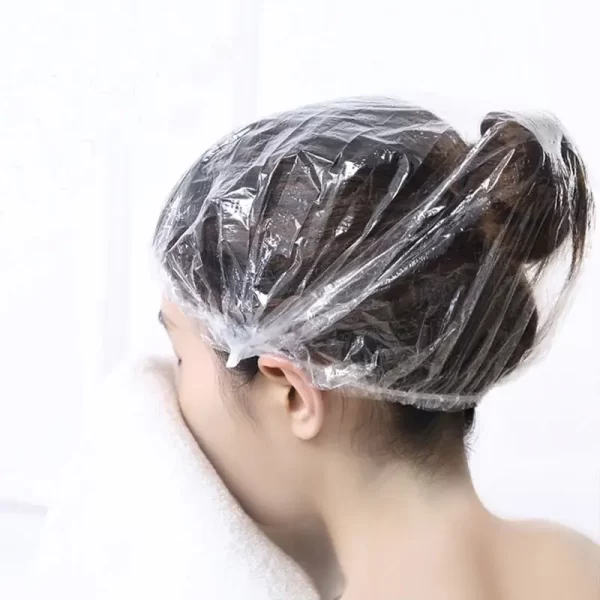Table of Contents
A Deeper Dive: Material and Sustainability Concerns of Plastic Shower Caps
As the global conversation around sustainability gains momentum, the lens of scrutiny turns to everyday items, revealing their often overlooked environmental implications. One such commonplace object is the humble plastic shower cap. Despite its banal appearance, this personal care item carries significant material and sustainability concerns. This article delves into the intricacies of these issues, fostering a deeper understanding of the environmental impact of plastic shower caps and exploring the possibilities for change.
Material Makeup of Plastic Shower Caps: An Overview
The first step in understanding the complexities of plastic shower caps is exploring their material composition. Typically, these caps are made from thin sheets of low-density polyethylene (LDPE) or polyvinyl chloride (PVC), two types of petroleum-based plastic.
LDPE is a flexible and moisture-resistant material, easily molded into the shape of a shower cap. On the other hand, PVC tends to be more rigid, but the addition of phthalates, a group of chemicals, can enhance its flexibility. However, it’s worth noting that phthalates are controversial due to potential health concerns, with some studies suggesting links to hormonal disruption and other health issues.
The production processes of both LDPE and PVC are energy-intensive and produce significant carbon emissions. Being petroleum-based, their manufacturing also involves the extraction and refining of crude oil, activities associated with environmental degradation and greenhouse gas emissions. Furthermore, both materials are non-biodegradable, posing severe disposal issues and sustainability concerns that we will explore in the following sections.
The Sustainability Concerns of Plastic Shower Caps: Unpacking the Problem
Perhaps the most urgent sustainability issue related to plastic shower caps is their contribution to the burgeoning global plastic waste crisis. As these caps are generally single-use, they are often disposed of after one use, inevitably ending up in landfills. In these environments, they take hundreds, if not thousands, of years to decompose. Even when they do break down, they merely fragment into microplastics—tiny particles that pervade various ecosystems, inflicting harm on marine life and other wildlife.
What compounds this issue is the fact that plastic shower caps are seldom recycled. Their low economic value and frequent contamination with hair and product residue render them unsuitable for recycling. As such, virtually every plastic shower cap ever produced still exists in some form, contributing to the ever-growing problem of plastic pollution.
The Hidden Environmental Costs of Material Production
The environmental implications of plastic shower caps are not confined to their disposal; their production process also carries a heavy environmental toll. The extraction of crude oil, the primary ingredient in most plastics, involves environmentally damaging practices such as drilling and fracking. These activities can lead to habitat destruction, biodiversity loss, and oil spills, which devastate marine and terrestrial ecosystems.
Furthermore, the conversion of crude oil into plastic materials involves processes that release a range of harmful greenhouse gases. This not only contributes directly to climate change but also exacerbates it indirectly, as the energy used in these processes often originates from burning fossil fuels.
Finally, the transportation of crude oil and finished plastic products around the globe adds to the overall carbon footprint of each shower cap. All these factors combine to create a significant environmental cost that is far too high for a product intended for a single use.
Eco-Friendly Alternatives: A Call for Change
The material and sustainability concerns of plastic shower caps highlight an urgent need for alternative solutions. Fortunately, several eco-friendly alternatives are emerging as viable replacements.
One such alternative is shower caps made from silicone. These are durable and resistant to bacteria, meaning they can be reused multiple times before needing replacement. While silicone is not biodegradable, its durability and longer lifespan mean fewer replacements and thus less overall waste.
Biodegradable plastic is another promising material. Biodegradable plastic shower caps have the convenience and functionality of traditional plastic caps but decompose significantly faster under specific conditions. They break down into water, carbon dioxide, and biomass, posing less harm to the environment.
Fabric shower caps, typically made from materials like organic cotton or hemp, offer another sustainable solution. These materials are biodegradable and often sourced and produced in an environmentally conscious manner, significantly reducing their carbon footprint.
Finally, there’s the option of creating your own reusable shower cap from repurposed materials. This DIY approach not only reduces waste but also allows for personalization and a more intimate connection with your everyday items.
Conclusion: Shaping a Sustainable Future
As we navigate the complex terrain of sustainability, understanding the material and sustainability concerns of everyday items like plastic shower caps is a crucial step. It illuminates the broader environmental implications of our consumption habits and highlights the pressing need for innovative, sustainable solutions.
It’s clear that the road to sustainability requires a collective shift in our consumer choices. As more individuals opt for eco-friendly alternatives, manufacturers will be compelled to prioritize sustainability in their products, initiating a ripple effect of positive change.
Embracing this change doesn’t mean sacrificing convenience or functionality. As we’ve seen, several alternatives to plastic shower caps offer similar benefits with significantly reduced environmental impact. These options represent not only a sustainable choice for us but also a hopeful step towards a more sustainable future for our planet.
Please visit our website for more product details https://medposnonwoven.com/product/pe-shower-caps/

